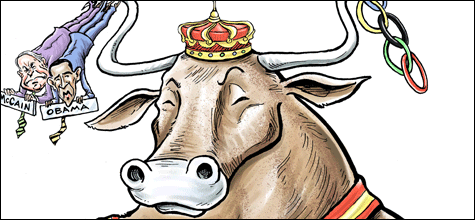
Illustration by Chad Crowe.
For the next month, self-important columnists will station themselves in Beijing and argue over which country established itself as the world’s biggest sporting superpower this summer — the United States, China, or maybe even Russia.
But — news flash — the contest is already over. The winner is (drum roll, please) . . . Spain. This surprise sporting development tells us something about the diminishing role of the Olympic Games in the modern sports world, the power shift going on in Europe, and even something about the state of the current presidential campaign.True, Spain won’t win all that many medals at the upcoming Games — but that’s beside the point. Despite all the hype about to smother the planet like a Beijing smog cloud, the Olympics will soon be unmasked as the overrated spectacle it is — one that is also long past its modern heyday, which occurred in an era when there were few other international competitions.
Today, of course, is much different. In terms of the intensity of worldwide interest, the Olympics pale in comparison with such events as soccer’s World Cup, and even the world cups for cricket and rugby. In the US, the Olympics do draw decent ratings, but mostly from a non-traditional-sports-fan demographic (i.e., women), attracted to both the “up close and personal” network portraits of the athletes and the focus on events that seem less physical than conventional sports (i.e., gymnastics).
But this year, even the patience of traditional US Olympics fans will be tested. Because of the 12-hour time difference between Beijing and the East Coast, most of the winners will be known via the Internet long before the events themselves are actually telecast here. Meanwhile, the audiences for any network television event are diminishing by the year — thanks to competition from the Web, cable, and other outlets.
So, even if the Chinese emerge as the upstart athletic power they have been quietly boasting they are, or the US once again fends off all challengers, fewer are likely to care than ever before — outside of China, of course.
A new armada
On the other hand, the Spanish have already won this summer’s triple crown, a feat that hardly raised a flicker of interest in the States, but that in many other parts of the world counted for a lot more than a bushel-full of Olympic hardware.
In late June, Spain captured the coveted European soccer championship for the first time since 1964. (It’s the third-most watched sporting event in the world, behind the soccer World Cup and the Olympics, according to Ted Wyman, a Canadian columnist.) Two weeks later, Rafael Nadal won Wimbledon for the first time, the first Spaniard to do so since Manuel Santana in 1966. (That’s the 10th-most watched sporting event in the world.) And, a weekend ago, Carlos Sastre won cycling’s Tour de France, the first Spaniard to do so since 1988. (The ninth-most watched sporting event in the world.)